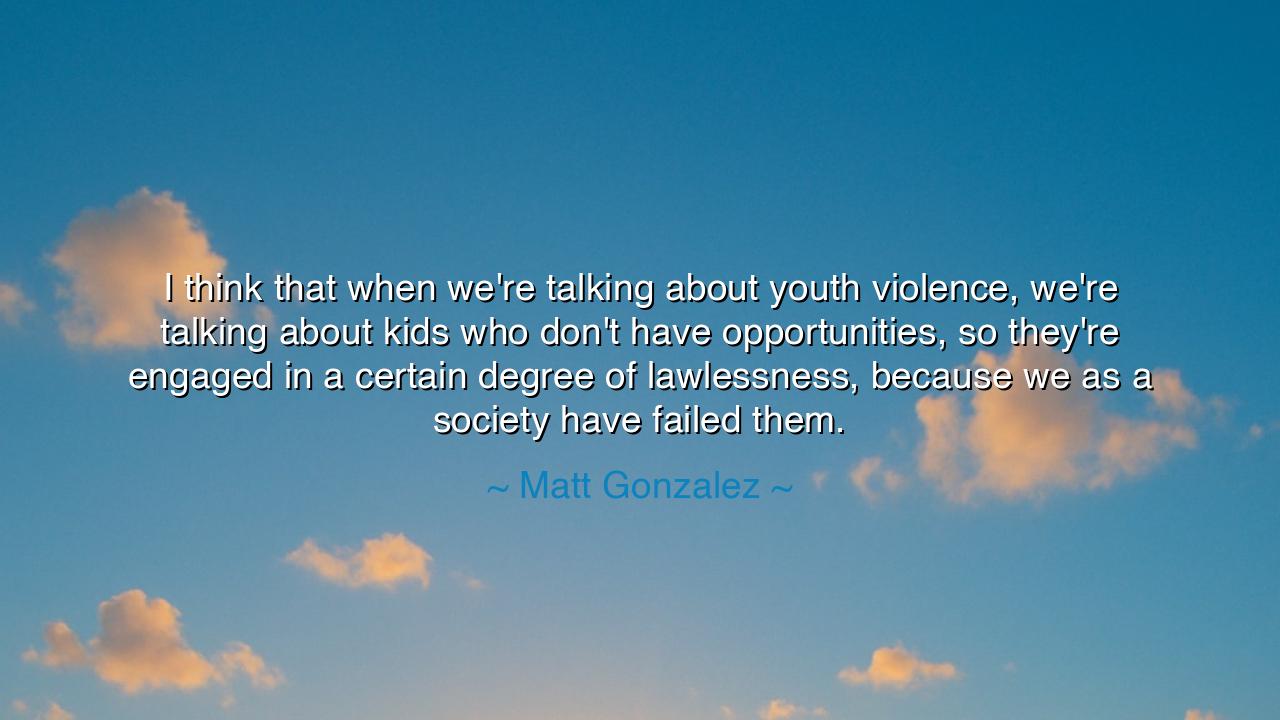
I think that when we're talking about youth violence, we're
I think that when we're talking about youth violence, we're talking about kids who don't have opportunities, so they're engaged in a certain degree of lawlessness, because we as a society have failed them.






Hear the words of Matt Gonzalez, words not of condemnation but of sorrow and recognition: “I think that when we’re talking about youth violence, we’re talking about kids who don’t have opportunities, so they’re engaged in a certain degree of lawlessness, because we as a society have failed them.” These words strike deep, for they shift the gaze of judgment from the young who stumble, to the elders who failed to build a path before them. They remind us that behind every act of violence by the young lies a deeper wound, one inflicted not by nature, but by neglect.
For children are not born violent. They are born with eyes full of wonder, with hearts open to love, with hands eager to create. When such souls fall into lawlessness, it is rarely by choice alone, but by the slow closing of doors—doors of education, of dignity, of belonging. Opportunities denied become futures stolen, and the streets become the cruel teachers of those abandoned by their elders. Thus Gonzalez speaks truly: society itself is guilty when its youth descend into despair and violence.
Consider the story of the slums of nineteenth-century London. There, in the shadow of the Industrial Revolution, countless children roamed the streets, hungry and unschooled. Thieves, gangs, and pickpockets were everywhere, but the crime was not born of inherent wickedness—it was born of deprivation. Writers like Charles Dickens cried out against this injustice, showing that the true crime lay not in the children’s lawlessness, but in a society that allowed its youngest to starve while the wealthy feasted. When reform finally came—schools, laws against child labor, protections for the poor—the violence lessened, not because the children changed, but because society did.
History repeats in many lands. In American cities, waves of youth violence in the twentieth century rose not from joy, but from poverty, segregation, and despair. Where jobs were stripped away, gangs took their place; where schools crumbled, the streets filled the void. Yet whenever communities invested in after-school programs, mentors, and work opportunities, the tide shifted. This proves Gonzalez’s wisdom: if you give young people opportunities, they will build rather than destroy, create rather than tear down. If you deny them, their fire burns uncontrolled.
The wisdom of this teaching is that the young are mirrors of the society that raises them. If they are violent, it is because they have learned violence from the world that surrounds them. If they are hopeless, it is because hope has not been offered. To blame them without blaming ourselves is to wash our hands like Pilate, pretending innocence while injustice festers. True accountability lies not only with the youth who err, but with the elders who failed to guide them.
The lesson is plain: if we desire a peaceful world, we must sow peace in the lives of our children. If we desire lawful citizens, we must give them the dignity of education, opportunity, and love. To scold the youth for their lawlessness while denying them a place to belong is hypocrisy. But to invest in them, to listen to them, to open doors for them—that is how a society redeems itself.
Therefore, O listener, let your actions be these: do not turn away from the children of your streets, but see in them your own future. Demand schools that inspire, not prisons that destroy. Mentor the young, offer them work, give them dignity. For every child lifted is one less hand raised in violence, one more hand building a better tomorrow. And remember this eternal truth: when the young fall, it is not they alone who have failed, but the whole of society. To save them is to save ourselves.






AAdministratorAdministrator
Welcome, honored guests. Please leave a comment, we will respond soon